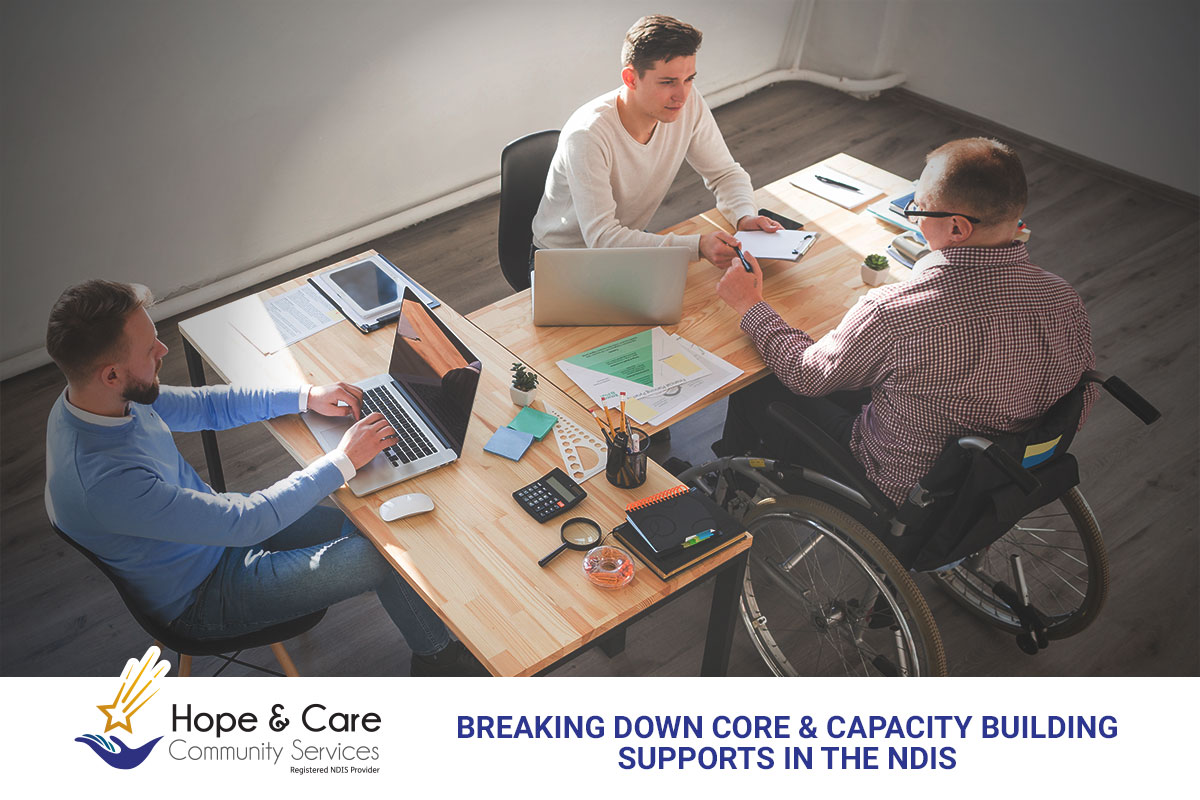
Understanding the funding categories in your NDIS plan is essential to making the most of your supports. Two key funding types—Core Supports and Capacity Building Supports—serve different but equally important purposes. Knowing how they work and how to use them effectively can help you achieve your goals and live more independently.
At Hope & Care Community Services, we want to simplify this for you. This article explains the difference between Core and Capacity Building Supports and provides practical tips to help you maximise your NDIS plan.
What Are Core Supports?
Core Supports provide funding for essential, everyday activities directly related to your disability. They aim to meet your immediate needs, helping you maintain a good quality of life. Core funding is also flexible, allowing you to shift funds between its subcategories if needed, as long as the spending aligns with your plan goals.
Key Areas of Core Supports
Assistance with Daily Life
This category helps you manage personal tasks and household chores. For example:
- Personal care tasks such as bathing, grooming and dressing.
- Household maintenance like cleaning, laundry, or gardening.
- Meal preparation or delivery services to ensure you have nutritious food.
Assistance with Social and Community Participation
Staying socially active boosts emotional well-being. This funding helps you participate in community and recreational activities, such as:
- Joining a local club or interest group.
- Attending community events or social gatherings.
- Participating in group activities, like art classes or sports.
Consumables
This category provides funding for everyday items you need because of your disability, including:
- Continence products like pads or catheters.
- Low-cost assistive technology, such as adapted eating utensils.
- Specialty nutrition products, if required.
Transport
Transport funding covers travel-related expenses, especially if your disability limits your ability to use public transport. Examples include:
- Taxi or rideshare services to attend work or appointments.
- Travel reimbursements for private transport arrangements.
Why Core Supports Are Important
Core Supports address your short-term and recurring needs, allowing you to maintain independence and manage daily life with ease. The flexibility within this category gives you the freedom to adjust your spending as your needs change.
What Are Capacity Building Supports?
Capacity Building Supports focus on developing your skills, independence and capabilities over time. Unlike Core Supports, these funds are allocated to specific areas and cannot be transferred between categories. This funding is designed to help you achieve long-term goals, like learning new skills, improving relationships, or gaining employment.
Key Areas of Capacity Building Supports
Support Coordination
Support Coordination helps you manage your NDIS plan effectively. This includes:
- Connecting with service providers.
- Managing your funds efficiently.
- Tracking your progress towards achieving your goals.
Improved Living Arrangements
Finding and maintaining appropriate housing can be a challenge. This funding supports activities such as:
- Searching for rental properties or supported accommodation.
- Modifying your home to meet accessibility needs.
- Navigating housing assistance services.
Increased Social and Community Participation
This category focuses on building the skills you need to engage more actively in your community. Examples include:
- Communication and social skills training.
- Mentoring programs to build confidence.
- Workshops that help you learn new hobbies or interests.
Finding and Keeping a Job
This funding supports employment-related goals, including:
- Job-seeking assistance and career counselling.
- Skills training to prepare for the workforce.
- Modifications to your workplace to accommodate your needs.
Improved Relationships
Healthy relationships are crucial to overall well-being. This funding focuses on:
- Behaviour support to manage challenges.
- Communication training to foster better interactions.
- Counselling to strengthen personal relationships.
Improved Health and Well-being
This category funds programs that enhance physical and mental health, such as:
- Exercise programs designed for your abilities.
- Nutrition and dietary advice.
- Stress management or mindfulness training.
Key Differences Between Core and Capacity Building Supports
Understanding the distinction between Core and Capacity Building Supports helps you use your NDIS plan effectively.
Purpose
- Core Supports: Focus on everyday tasks and immediate needs.
- Capacity Building Supports: Develop your skills for long-term independence.
Flexibility
- Core Supports: Funds are flexible and can often be reallocated within this category.
- Capacity Building Supports: Funds are allocated to specific goals and cannot be moved between categories.
Time frame
- Core Supports: Provide ongoing support for short-term or recurring needs.
- Capacity Building Supports: Focus on long-term growth and achieving milestones.
Tips to Maximise Your NDIS Plan
Making the most of your NDIS plan requires understanding your goals and how to allocate your funds wisely. Here is how you can do that:
Clarify Your Goals: Start by identifying your short-term needs and long-term aspirations. This will help you decide how to use your Core and Capacity Building funds.
Work with Professionals: Engage with support coordinators and therapists who can guide you in implementing your plan effectively.
Track Your Spending: Regularly review your expenses to ensure you are staying on track and using your funds in line with your goals.
Ask Questions: If you are unsure about your funding or need help understanding your options, do not hesitate to seek advice from your service provider.
Conclusion
Core and Capacity Building Supports are both essential elements of your NDIS plan, each serving a unique purpose. Core Supports focus on your immediate needs, while Capacity Building Supports empower you to grow and achieve long-term goals. At Hope & Care Community Services, we are here to help you make sense of your plan, maximise your funding and reach your full potential. With the right understanding and guidance, your NDIS plan can be a powerful tool for independence and success.
Want to learn more? Read other articles :
- Redefine Independence your own way – with HCCS
- Who’s Who: The Key Terms of Your NDIS Plan
- Foundational Supports: Building Blocks of NDIS Success
HCCS is a registered NDIS provider. Learn more about our services.
♥ We are available in Brisbane! – Our team is just a call away!
